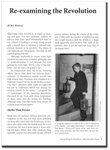Great set of writing / resources from the Zinn Education project - copied and pasted from their mass e-mail:
 Re-examining the Revolution. Background Reading. By Ray Raphael. Based on his book Founding Myths, Raphael critiques the textbook portrayal of the American Revolution. The textbooks say that "a few special people forged American freedom" which "misrepresents, and even contradicts, the spirit of the American Revolution." Re-examining the Revolution. Background Reading. By Ray Raphael. Based on his book Founding Myths, Raphael critiques the textbook portrayal of the American Revolution. The textbooks say that "a few special people forged American freedom" which "misrepresents, and even contradicts, the spirit of the American Revolution." |
|
 |
 Frederick Douglass: "The Meaning of July Fourth for the Negro" (1851). Film clip. Read by Danny Glover. From Voices of a People's History of the United States. In this famous speech, Douglass says: "What, to the American slave, is your 4th of July? I answer; a day that reveals to him, more than all other days in the year, the gross injustice and cruelty to which he is the constant victim." Watch film clip | Read speech. Frederick Douglass: "The Meaning of July Fourth for the Negro" (1851). Film clip. Read by Danny Glover. From Voices of a People's History of the United States. In this famous speech, Douglass says: "What, to the American slave, is your 4th of July? I answer; a day that reveals to him, more than all other days in the year, the gross injustice and cruelty to which he is the constant victim." Watch film clip | Read speech. |
Views: 85
Replies to This Discussion
-
I recently wrote a short piece on my personal story of resisting the draft in the 50's and 60's. Tangentially relevant to this discussion about American values...
-
-
Fred, thanks so much for sharing. I really loved this paragraph,
"[I was] wondering why that word pacifist is so seldom heard these days. It is not an especially euphonic word, and peace is such a maligned archetype; one sometimes hears peace-maker, but even that has a wimpy feel. War resister is an old standby, but it again uses the target word rather than its replacement, and "resist" is one of those words that almost implies eventual defeat, or at best stalemate. I want to create a word for the activist peace perpetrators, the forthright full voiced advocates for a world order based on our common humanity, the collaborators and communicators who together make us all truly secure."
It is interesting how powerful a single word can be in crafting a message - I'll lever forget the debate over Obamacare where "end-of-life-care" had some evil genius Republican morphing to "death-panels" and how this reframed peoples thinking. I like "Peace Perpetrators" but the ladder word also has a negative connotation? What about "Peace Creator?" Still an action word? Yes? Just a thought but we do need more peace, eh?
I visited Hiroshima in '02 and like you wrote was very overwhelmed with my American-ness in the face of such an extreme tragedy. I was also humbled with the grace and kindness of my Japanese guides. That, I thought, was certainly something to strive for!
On a less related note - how did you find out about Cowbird? I did not join but it looks interesting. Your thoughts?
-
-
Thanks for your thoughtful reply, Ryan. I did sort of discover the word I'l like to rehabilitate after writing the peace, in the course of a thread of comments on the iAnthology Ning of the National Writing Project, where I first wrote the essay - "Peacenik" - and used that for the title. It's not likely to be a rehabilitation campaign that grows legs very soon, however. "Peace Builder" is my current favorite for a term that will be most readily understood and has the least equivocal ring to it.
I got an early invite to Cowbird, I'm not sure why - probably some digital storytelling list link or something. I like the simplicity of the formatting, and the community networking aspect, but I've not written a lot there.
I'd encourage all MC Poppers to check out the "Making Learning Connected" MOOC, which in a way inspired the piece - it's a MOOC as Collaboration rather than Class or Course, so it's highly egalitarian with lots of lively and constructive discussion. Here's the sign-up link
and here's a link to the Google+ Community, where a lot of the action is
https://plus.google.com/u/0/communities/111619469354411254407
There are no deadlines or requirements, lurkers welcome, but it's so interesting most jump right in.
Cheers, Fred -
-
Peace builder - yeah, I like that! Thanks for all the other recs as well - I will check them all out! RRG:)
-
© 2025 Created by Ryan Goble.
Powered by
![]()
